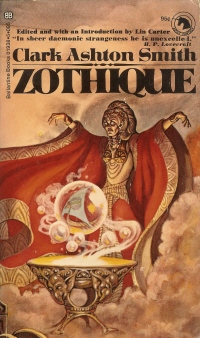 Cover of Zothique | |
| Author | Clark Ashton Smith |
|---|---|
| Cover artist | George Barr |
| Language | English |
| Series | Ballantine Adult Fantasy series |
| Genre | Dark fantasy |
| Published | 1970 (Ballantine Books) |
| Publication place | United States |
| Media type | Print (paperback) |
| Pages | xiii, 273 pp |
| ISBN | 0-345-01938-5 |
| OCLC | 427117 |
| Followed by | Hyperborea |
Zothique is a collection of fantasy short stories by Clark Ashton Smith, edited by Lin Carter. It was first published in paperback by Ballantine Books as the sixteenth volume of its Ballantine Adult Fantasy series in June 1970. It was the first themed collection of Smith's works assembled by Carter for the series. The stories were originally published in various fantasy magazines in the 1930s, notably Weird Tales . [1]
